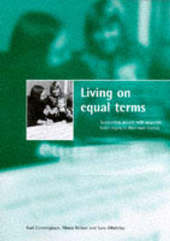
|
Living on equal terms: Supporting people with aquired brain injury in their own homes
Paperback / softback
Main Details
| Title |
Living on equal terms: Supporting people with aquired brain injury in their own homes
|
| Authors and Contributors |
By (author) Gail Cunningham
|
|
By (author) Moira Wilson
|
|
By (author) Sara Whiteley
|
| Physical Properties |
| Format:Paperback / softback | | Pages:96 | | Dimensions(mm): Height 297,Width 210 |
|
| ISBN/Barcode |
9781861341105
|
| Classifications | Dewey:362.24 |
|---|
| Audience | | Undergraduate | | Postgraduate, Research & Scholarly | | Professional & Vocational | |
|---|
| Illustrations |
No
|
|
Publishing Details |
| Publisher |
Policy Press
|
| Imprint |
Policy Press
|
| Publication Date |
8 June 1998 |
| Publication Country |
United Kingdom
|
Description
Brain injury can have a devastating long-term effect and lead to a range of disabilities. Established by Edinvar in 1993, Connections provides flexible support to enable people with acquired brain injury to live in ordinary housing, instead of hospital or supported accommodation, and to develop community links. It was set up in response to a perceived lack of opportunity for people with acquired brain injury to return to the community. This evaluation of the Connections service: establishes whether or not the Connections model satisfactorily supported people to live in the community; identifies the key features of the service; reports on interviews with service users and carers, referring and non-referring agencies and funding agencies; explores the usefulness of the model for replication by other agencies. Edinvar is a group of organisations, including a housing association and a community care charity, which is committed to promoting living on equal terms for all members of the community. It has been in operation for 25 years, providing a number of different services for people with a range of needs - one such service is Connections. This report of the evaluation is essential reading for all those involved in disability issues and community care as it investigates a service which is based on a social model of disability and which uses a person-centred planning approach in practice.
Author Biography
Robert Walker, Department of Social Policy & Social Work, Oxford University
|